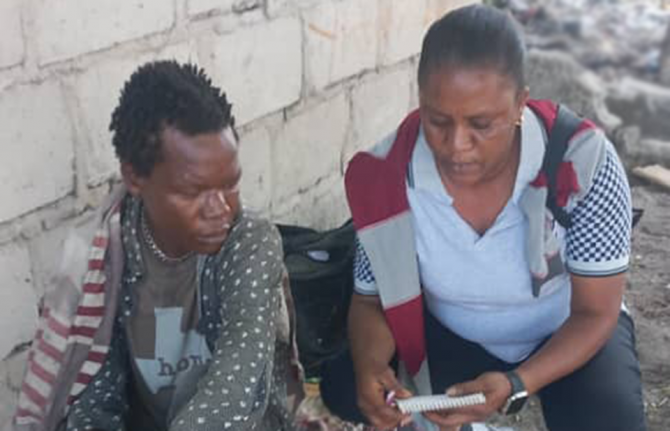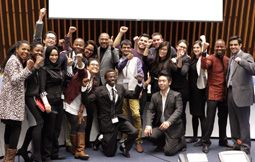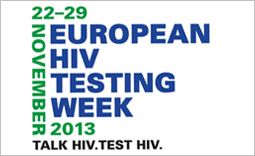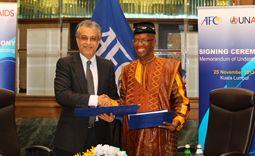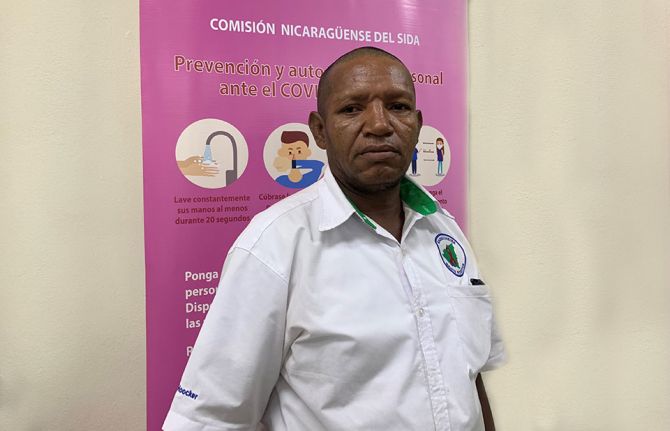
Feature Story
Landmark forum in China to champion rights-based approach to HIV
06 July 2010
06 July 2010 06 July 2010 Vice Minister Yin Li addressed the Forum on 5 July 2010
Vice Minister Yin Li addressed the Forum on 5 July 2010For the first time in China, government and civil society have formed a partnership to offer innovative ideas from a rights-based perspective to strengthen the national response to HIV. The China Red Ribbon Beijing Forum was launched on 5 July 2010 at a high-level meeting attended by Vice Minister of Health Yin Li and more than 100 members of civil society, including grassroots organizations.
The Chinese government places great importance on the AIDS response.
China’s Vice Minister of Health Yin Li
“The Chinese government places great importance on the AIDS response,” said Vice Minister Yin Li. “National leaders are setting a strong example in advocating and driving all sectors of society to protect the human rights of people living with HIV and AIDS, reducing stigma and discrimination and leading the way forward.”
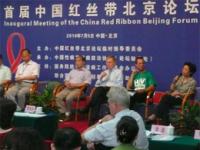 Forum speakers respond to questions from the floor.
Forum speakers respond to questions from the floor.“What’s happened here today is truly significant, and we shouldn’t underestimate its importance,” observed Steve Kraus, Director, UNAIDS Regional Support Team Asia-Pacific. “Partnership between government and civil society, fostering candid and open debate, is critical to success for all national AIDS programmes.”
Only by adopting a people-centred approach, by ensuring the protection of people’s rights, can strategies and measures in our AIDS response be fully implemented, the scope of our response be expanded, and the lives of those living with or affected by HIV be improved.
Dr Wang Longde, president of the Chinese Preventive Medicine Association and chair of the Forum’s Interim Steering Committee
Dr Wang Longde, president of the Chinese Preventive Medicine Association and chair of the Forum’s Interim Steering Committee emphasized that “Only by adopting a people-centred approach, by ensuring the protection of people’s rights, can strategies and measures in our AIDS response be fully implemented, the scope of our response be expanded, and the lives of those living with or affected by HIV be improved.”
The Forum’s 14-member Interim Steering Committee includes representatives from government and civil society. It will be replaced after a year by a Steering Committee whose membership will be chosen through wide consultation with civil society and other stakeholders.
Rights-based approach
 Mr Steve Kraus, Director UNAIDS RST Asia Pacific.
Mr Steve Kraus, Director UNAIDS RST Asia Pacific.Thomas Cai is founder of AIDS Care China whose community-based HIV care work has been honoured both internationally and at home. An appointee to the interim committee, he is convinced that the initiative is an opportunity for a new way of doing things.
“This Forum should and will be more than just rhetoric,” Cai explained. “Yes, there is skepticism about whether it is truly going to make a difference, or if it’s more show than substance. But by using HIV as an ‘experiment’, if you will, the aim is to strengthen the rights-based approach that serves as our context.”
Looking forward
A broad range of issues were discussed including how the law can be crafted to protect the rights of those vulnerable to, or living with, HIV; how to address stigma and discrimination; and how HIV prevention efforts can be strengthened across China through rights-based approaches.
“Converting the discussions into concrete results is the next step,” said Mark Stirling, UNAIDS Country Coordinator for China.
Forum delegates already highlighted a number of areas that need to be prioritized. These include:
- Incorporating a rights-based approach into China’s next HIV/AIDS Five-Year Action Plan (2011-2016);
- Ensuring compliance with existing anti-discrimination clauses, and conducting a legal audit to assess where conflicting laws need to be revised or removed;
- Creating a standardised framework to address compensation for HIV infection through contaminated blood products or the selling of blood;
- Addressing the need for registration and legal recognition of non-governmental and community-based organizations;
- Fostering dialogue between the Ministries of Health, Public Security and Justice to examine how harm reduction work could be strengthened to reduce the risks of infection to injecting drug users, sex workers and men who have sex with men;

Feature Story
National ownership pivotal to sustained HIV responses
02 July 2010
02 July 2010 02 July 2010 Family in Djibouti. Credit: UNAIDS/P. Virot
Family in Djibouti. Credit: UNAIDS/P. VirotNational ownership is central to sustainable AIDS responses and is beyond doubt a path to improved aid effectiveness. To set the stage for engaged debates on national ownership and actions to realize this, UNAIDS organized a consultation in Geneva on 21 June 2010 that brought together government representatives, civil society, representatives from regional political bodies, and development partners.
The dialogue resulted in a clear definition of national ownership which is:
“Inclusive multi-sectoral national leadership at all levels in managing the design of effective AIDS policy and strategy, its implementation, monitoring, reporting and sustainable resourcing as part of the national development agenda, and for assuring board result-based mutual accountability mechanisms and national capacities to strengthen the AIDS response”.
Participants also established indicators to measure progress. These indicators cover multi-sectoral AIDS coordination; non-discriminatory laws and regulations; inclusive process in the development of Strategy, work plan, operational plan and review; monitoring and evaluation and mutual accountability system; integration of HIV in national development plans and capacity development plans; sustainable HIV financing; mutual financial accountability mechanisms; alignment and harmonization; and capacity building.
Addressing the forum, Mr Michel Sidibé, executive director of UNAIDS, highlighted the need for countries and donors to move from short-term aid commitments to longer term financing that is both predictable and sustainable. According to Mr Sidibé key to achieving this is “understanding the interaction of ownership and external funding” which can happen by focusing on the ways that significant donors actually enable national ownership and empower country partners.
The US Global AIDS Coordinator Ambassador Eric Goosby stressed the importance of “mutual accountability.” He pointed out the imperative that donors “carry out their development work in such a way that engagements with country partners and priorities are mutually beneficial.”
The participants discussed strategic incentives to foster greater country partner ownership of national AIDS policies and programmes and to encourage production and use of evidence. In addition, how national ownership can be enhanced by mobilizing greater domestic resources and investments, and the roles and action that country partners and development partners can employ together to strengthen ownership.
Renewed approach to technical assistance and capacity building
Better and more sustainable articulation of countries’ needs, mentoring countries with counterparts from the North, coupled with the aggressive development of TA in the South and South-South cooperation would result in a renewed approach to technical assistance (TA). This could ensure that it is driven by demand rather than by supply. To strengthen national ownership, the inclusion of capacity building support as an integral part of joint operational planning would strengthen country’s responses. Zambia’s Minister of Health, H.E. Kapembwa Simbao, pointed out that “national ownership refers to the availability of in-country expertise to monitor their programmes.”
UNAIDS Secretariat, in collaboration with all stakeholders, will continue to foster national ownership so that countries can make evidence-informed decisions and invest funds where they are most needed in order to achieve better outcomes for the AIDS response as well as the countries’ wider health and development goals. UNAIDS also plans to continue to support country and regional consultations that include all constituents.
Right Hand Content
Feature stories:
Kenya’s experience informs new resource for increasing coordination on AIDS (21 November 2008)
Related
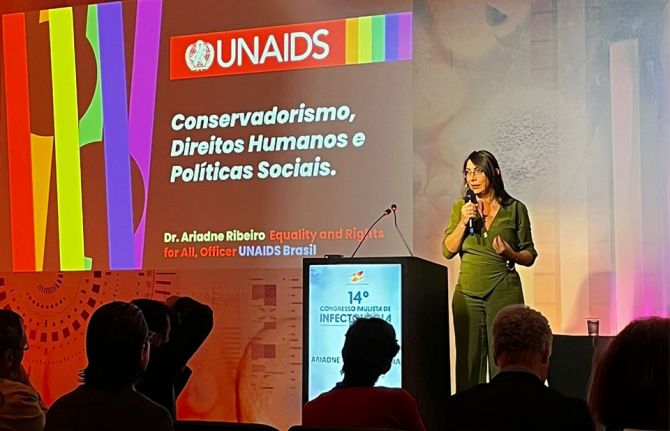 Upholding dignity for everyone: Ariadne Ribeiro Ferreira
Upholding dignity for everyone: Ariadne Ribeiro Ferreira

21 November 2024

Feature Story
The judiciary and the AIDS response
30 June 2010
30 June 2010 30 June 2010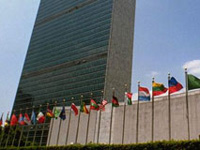
The AIDS epidemic has raised new and complex legal and human rights challenges leading to judicial rulings on matters related to HIV that have become part of the jurisprudence of many countries. Through interpretation of national constitutions, legislation and international human rights treaties, the judiciary has sometimes had a transformative and beneficial impact on the national response to HIV and on the public perception of HIV.
Enabling jurisprudence has emerged in countries as diverse as Australia, Botswana, Brazil, India, Iran, Kenya, Namibia, South Africa, United Kingdom, United States of America and Venezuela. This includes judgments on employment law, access to education, medical insurance, treatment in prisons, segregation, confidentiality, access to medicines, and the rights of prisoners. Through a well-informed, evidence-based and protective application of the law, the judiciary can create the type of legal and social environment necessary to halt and roll back the AIDS epidemic; to provide access to justice to those affected; and to achieve national commitments to attain universal access to HIV prevention, treatment, care and support.
Beyond the court, members of the judiciary are leaders in their communities and societies who should be engaged in the response to HIV. Their stance, attitudes and behaviour towards HIV-related issues, people living with HIV and members of most at risk populations can help shape social attitude towards these populations. Members of the judiciary can challenge stigma and discriminatory practices against people living with HIV and members of key populations both inside the court and within the community at large.
However, in the quickly evolving area of scientific, medical and legal issues related to HIV epidemic, there has been little opportunity for judges to take stock of epidemiological and scientific developments. Nor has role of members of the judiciary as agents of justice and protectors of human rights been fully explored or used to address vulnerability to HIV and ensure human rights protection for all in the context of the epidemic.
Recognising the potential and actual role of the judiciary in the AIDS response, UNAIDS is committed to supporting the judiciary, including in the following areas:
- Providing opportunities for continuing education and discussion among the judiciary on recent developments in the HIV response and their legal implications
- Supporting judges to make the courts more accessible to all people affected by HIV
- Stimulating rights-based and evidence-informed standard-setting on pertinent HIV-related legal and human rights issues by and for members of the judiciary
- Creating opportunities for members of the judiciary to exchange with key stakeholders of the HIV response, including people living with HIV, women affected by HIV, and members of key populations at higher risks.
UNAIDS’ support to judiciary leadership is guided by its commitment to working with key national and international actors towards the removal of “punitive laws, policies, practices, stigma and discrimination that block effective responses to AIDS”, as affirmed in the UNAIDS Outcome Framework 2009-2011
UNAIDS sees members of the judiciary as key stakeholders in supporting and enforcing a protective legal environment to the HIV response.
According to Susan Timberlake, Senior Human Rights and Law Advisor at UNAIDS, “Through the courts, judges can uphold non-discrimination based on HIV status, protect women and key populations from violence and denial of services, and overturn punitive laws that violate human rights in the context of the epidemic.”
As part of the efforts to engage the judiciary in the HIV response a groundbreaking meeting of eminent African jurists was held in Johannesburg, South Africa in December 2009 to discuss HIV and the law in the 21st century.
Right Hand Content
Feature stories:
Eminent African Jurists discuss HIV and the law (14 December 2009)
Publications:
Report of the Meeting of Eminent African Jurists on HIV and the law in the 21st century (2010) (pdf, 238 kb)
Statement of Principles on HIV, the Law and the Judiciary in sub-Saharan Africa (pdf, 23 kb)
Courting Rights: Case Studies in Litigating the Human Rights of People Who Live with HIV (UNAIDS, 2006) (pdf, 120 kb)
HIV in Africa in the 21st century: Brief for the Judiciary (UNAIDS, 2009) (pdf, 700 kb)
Related

Feature Story
New HIV prevention commission will be called on to boost global effort
25 June 2010
25 June 2010 25 June 2010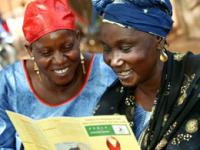
In December 2009, UNAIDS Executive Director Michel Sidibé called for a “prevention revolution” and announced the formation of a UNAIDS High Level Commission on HIV Prevention. The Commission, composed of political, business, activist and philanthropic leaders, will lead a political action campaign over the coming year to galvanize commitment at the highest level in support of effective HIV prevention programmes.
The Commission will be launched at the International AIDS Conference in Vienna, Austria on 21 July 2010. Ahead of the launch, the Commission’s Co-chairs, Professor Françoise Barré-Sinoussi, Nobel Prize Laureate in Medicine for her role in the discovery of HIV, and Archbishop Emeritus Desmond Tutu, have endorsed a statement, prepared by the Commission’s Scientific Advisory Panel, calling for renewed leadership and intensified action to prevent new HIV infections.
This statement is open for signature by scientists, activists, and others supporting effective HIV prevention programmes. The statement and list of supporters will be presented at the Commission’s launch.
To sign-on to the statement, visit http://aidsspace.org/commission.php. (The web site is hosted by AIDSspace.org and is available in English, French, Spanish, Russian, Chinese and Arabic). The deadline for signatures is 9 July 2010.
Right Hand Content
Speeches:
Mobilizing prevention as a movement for universal access (pdf, 383 Kb)
Feature stories:
Michel Sidibé calls for prevention revolution in opening address at UNAIDS’ governing body meeting (08 December 2009)
%External links:

Feature Story
UNAIDS Executive Director presents progress report to Board
23 June 2010
23 June 2010 23 June 2010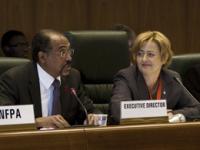 (from left) Mr Michel Sidibé, Executive Director of UNAIDS; Ms Yoka Brandt, Director-General, International Cooperation, Ministry of Foreign Affairs, The Netherlands
(from left) Mr Michel Sidibé, Executive Director of UNAIDS; Ms Yoka Brandt, Director-General, International Cooperation, Ministry of Foreign Affairs, The NetherlandsCredit: UNAIDS/F. Chironi
UNAIDS governing body, the Programme Coordinating Board (PCB) is holding its 26th Board meeting from 22-24 June 2010 in Geneva.
UNAIDS Executive Director Michel Sidibé addressed the Board on 23 June giving an overview of progress in last six months by the Secretariat, partners and Cosponsors. The UNAIDS Annual Report 2009 was also shared with the Board members.
In his speech, “Delivering results in transformative times”, Mr Sidibé laid out a “reinvigorated mission” for the Joint Programme. Mr Sidibé also identified five challenges for UNAIDS and described approaches for a more focussed UNAIDS, acting more strategically, increased flexibility and responsiveness, a more efficient Secretariat and more accountability.
On 22 June a thematic session took place on “Linking Sexual and Reproductive Health (SRH) services with HIV/AIDS interventions in practice”. Issues related to gender and youth education were also discussed under this theme.
Stakeholders involved in the AIDS response have always been of the opinion that the Millennium Development Goals will not be achieved without ensuring universal access to sexual and reproductive health and HIV prevention, treatment, care and support.
The majority of HIV infections are sexually transmitted or are associated with pregnancy, childbirth and breastfeeding; and the risk of HIV transmission and acquisition can be further increased due to the presence of certain sexually transmitted infections (STI). HIV is the leading cause of death in women of reproductive age, particularly in Sub-Saharan Africa, and contributes significantly to maternal mortality.
UNAIDS Executive Director Michel Sidibé has maintained that, “If we integrate HIV into maternal health programmes, we can make huge progress on almost every global development goal. We can stop mothers from dying of HIV and dramatically reduce maternal mortality.” Most of UNAIDS cosponsors are also involved in improving this field, enhancing human rights and promoting HIV prevention services.
The thematic session of the Board meeting provided a platform for stakeholders and participants to review the challenges of integrating sexual and reproductive health services with HIV interventions and vice-versa, and share lessons and best practices.
Special attention was paid to young people and gender issues, where progress in involving men and boys in SRH services and programmes that address harmful gender norms were included. Young people tend to be more motivated to use condoms to prevent unintended pregnancy than HIV. Programmes that focus on both can broaden their appeal and have an important impact on preventing pregnancy and STIs.
Sexual violence, sexual diversity and sexuality education with due respect to human rights, gender issues and greater involvement of people living with HIV was also addressed.
Participants were invited to discuss opportunities for women to control or influence their own sexuality and reproduction and to become familiar with the female condom. For pregnant women living with HIV, the single most significant intervention that could reduce maternal mortality, and virtually eliminate vertical transmission -- namely the timely initiation of antiretroviral therapy for life -- remains largely underutilized.
Established in 1994 by a resolution of the UN Economic and Social Council and launched in January 1996, UNAIDS is guided by a Programme Coordinating Board (PCB) with representatives of 22 governments from all geographic regions, the UNAIDS Cosponsors, and five representatives of nongovernmental organizations, including associations of people living with HIV.
Right Hand Content
Speeches:
Speech by UNAIDS Executive Director “Delivering results in transformative times”
Publications:
UNAIDS Annual Report 2009 (pdf, 2.12 Mb)
Advancing the sexual and reproductive health and human rights of people living with HIV (pdf, 2.04 Mb)
Related
 “Who will protect our young people?”
“Who will protect our young people?”

02 June 2025

Feature Story
UNAIDS’ call to Kenya for sustainable financing for HIV response gets major boost in national budget
18 June 2010
18 June 2010 18 June 2010
Kenyan Finance Minister Uhuru Kenyatta presented the national budget for the 2010-2011 financial year to parliament on 10 June. The budget sees a near doubling of past allocations for HIV treatment, earmarking Ksh. 900 million (US$ 11.25 million) for antiretroviral treatment.
Earlier this year UNAIDS Executive Director, Michel Sidibé jointly launched the country’s National AIDS Strategic Plan (2010- 2013) with the Prime Minister, Right Honorable Raila Odinga. Mr Sidibé and the Kenyan Government then signed a Memorandum of Understanding committing the two parties to joint actions in several key areas including sustainable financing to support the national HIV response; and virtual elimination of vertical transmission of HIV from mother-to-child. During his visit Mr Sidibé also met with the President, His Excellency Mwai Kibaki as well as key ministers involved in the HIV response.
UNAIDS welcomes the government’s increase in domestic funding towards the national AIDS response.
Michel Sidibé, UNAIDS’ executive director
Mr Sidibé then called on the government of Kenya to earmark Ksh. 1 Billion per year to ensure the continuity of HIV treatment for people in need and to reduce instances of medicine stock-out threats. He also recommended the government counter donor dependency and develop a Cabinet paper on long-term sustainable financing of the national AIDS response including exploring options for increasing domestic resource mobilization such as airtime tax and airline taxes.
“UNAIDS welcomes the government’s increase in domestic funding towards the national AIDS response,” said Mr Sidibé, UNAIDS’ executive director.
In addition, a high-level steering committee has been established by the government to explore sustainable financing and a concept paper on alternative domestic financing scenarios has been developed detailing critical building blocks required to be put in place. The culmination of these efforts will be the development of a cabinet paper which will substantially reduce the country’s dependence on external financing for HIV programmes.
Right Hand Content
Related
 Upholding dignity for everyone: Ariadne Ribeiro Ferreira
Upholding dignity for everyone: Ariadne Ribeiro Ferreira

21 November 2024

Feature Story
Helping Vietnamese youth protect themselves against HIV
16 June 2010
16 June 2010 16 June 2010 “This is a unique experience with the UN I’ve never seen elsewhere,” said Lisa Sherburne, an HIV specialist with Save the Children. Credit: UN
“This is a unique experience with the UN I’ve never seen elsewhere,” said Lisa Sherburne, an HIV specialist with Save the Children. Credit: UNPham Xuan Tung talks eagerly and takes notes for his group during a biology lesson on HIV transmission and the replication of the virus in blood cells. This new type of highly interactive class is something Tung, a student at Hoang Quoc Viet upper secondary school in Dong Trieu District, Quang Ninh Province, clearly enjoys.
The class is based on a new, integrated reproductive health and HIV prevention curriculum for secondary school students being developed and piloted by the Ministry of Education and Training (MOET), with support from UNICEF, UNFPA, UNESCO and Save the Children in Viet Nam. Many students in Quang Ninh Province, Quang Tri Province and Ho Chi Minh City are following the new pilot curriculum.
A comprehensive national HIV prevention curriculum

Many students in Quang Ninh Province, Quang Tri Province and Ho Chi Minh City are following the new pilot curriculum. Credit: UN
“I have seen a positive change in the participation of students in my class. The new teaching and learning method allows room for every student to speak up, and they are much more responsive,” said Tung’s teacher Truong Thi Hoa.
The new curriculum for secondary schools nationwide draws on UN-supported work in schools, including healthy living and life skills programmes, reproductive health and HIV prevention initiatives, and pre-service training for teachers. Integrating the areas into core lessons and extra-curricular activities, it includes special training for parents so they can better discuss HIV and reproductive health issues with their children – subjects that can be particularly sensitive and difficult to address.
I have seen a positive change in the participation of students in my class. The new teaching and learning method allows room for every student to speak up, and they are much more responsive.
Truong Thi Hoa, teacher
“This is a unique experience with the UN I’ve never seen elsewhere,” said Lisa Sherburne, an HIV specialist with Save the Children. “It allows more resources, more cohesive actions and a more powerful voice for the Viet Nam education sector.”
The changes are all aimed at integrating HIV prevention into the next national curriculum framework and new textbooks to be developed by the ministry and approved by the National Assembly in 2015.
However, many challenges remain. The ministry needs strong political leadership and greater capacity for planning and coordination, sufficient resources, teachers with better capacity, and effective intra-ministry and multisectoral coordination.
“Our biggest challenge is how to facilitate the close collaboration among departments in the ministry and among ministries related to the education sector response to HIV,” says La Quy Don, vice director of MOET’s Department of Student Affairs.
For Eamonn Murphy, UNAIDS Viet Nam Country Director, this is also a top priority. “We are committed to providing joint support for policy-making, enhanced coordination and implementation of several key aspects of the education sector’s response to HIV.”
Empowering young people to protect themselves against HIV is a key priority area in UNAIDS Outcome Framework 2009-11.
Right Hand Content
Cosponsors:
Partners:
Feature stories:
Sexuality education an imperative for children and young people in a world affected by AIDS (10 December 2009)
UNAIDS Task Team develops effective tools to help young people tackle HIV (05 June 2009)
HIV response and the education sector: UNESCO Best practice series (04 May 2009)
Publications:
A Strategic Approach: HIV & AIDS and Education UNAIDS IATT on Education, 2008 (pdf, 327 Kb.)

Feature Story
UNAIDS Web Contest 2010
15 June 2010
15 June 2010 15 June 2010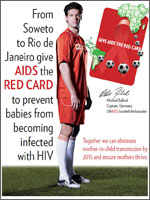
Every 4 years, the world turns its eyes to the football World Cup, the biggest sporting tournament on the planet. This year, the World Cup is being held in South Africa with many top teams and stars taking part. As in years past, UNAIDS will be hosting a web-competition, under the slogan “Give AIDS the Red Card” in order to celebrate the games. With the help of UNAIDS Goodwill Ambassadors Michael Ballack and Emmanuel Adebayor, the “Give AIDS the Red Card” campaign leads us in the direction of preventing and ending mother-to-child transmission of HIV by the year 2015.
Contestants can win a variety of prizes, including signed memorabilia from players, if they can answer these 3 questions correctly:
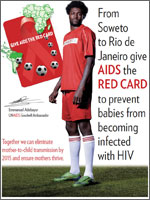
1.HIV infection is widely stigmatized and people living with HIV often face discrimination. What is an effective way of tackling stigma and discrimination?
2.What is the purpose of UNAIDS’ new campaign featuring Ballack and Adebayor “Giving AIDS the Red Card”?
3.As of 2008, how many people were living with HIV in Sub Saharan Africa?
Send your answer to competition@unaids.org by July 11th 2010
Good Luck!
Right Hand Content
Partners:
Michael Ballack
Emmanuel Adebayor
Press centre:
UNAIDS launches ‘red card’ campaign against HIV (12 June 2010)
Feature stories:
Ahead of World Cup, national team captains appeal: “Give AIDS the red card” (07 June 2010)
Publications:
Related

Feature Story
UNAIDS welcomes the efforts of UNITAID towards the creation of a patent pool entity
10 June 2010
10 June 2010 10 June 2010
UNAIDS welcomes the efforts of UNITAID towards the establishment of the Patent Pool Foundation, scheduled for July this year. On 8 June 2010 the UNITAID Board made the final decision to move forward with the new Medicines Patent Pool Foundation and to provide US$ 4.4 million for its first year of operations.
"What this means in practical terms," said Mr Philippe Douste-Blazy, Chair of the UNITAID Executive Board, "is that formal negotiations with the patent holders can now begin. We expect the Patent Pool Foundation to have its first licenses within a year."
Access to HIV treatment is a key issue of universal access, and if a patent pool is successful in obtaining licenses for AIDS drugs it will contribute towards lowering the price of drugs and promote the production of fixed drug combinations as well as encourage generic manufacturers to produce WHO prequalified antiretroviral (ARV) drugs including pediatric ARVs.
“A successful patent pool will help in accelerating the scaling up access to care and treatment and will decrease the risk of stock out of medicines in the developing world,” said Mr Michel Sidibé, UNAIDS executive director.
Why a patent pool?
A patent pool brings together the patent rights held by different owners such as universities, pharmaceutical companies or government institutions, and makes them available on a non-exclusive basis. Through this mechanism, developers of pharmaceutical products could access a “one-stop-shop” for patents. In return producers pay a royalty to the patent holder.
Such a pool could make it easier to produce new medicines that combine several pharmaceutical compounds patented by different companies into a single pill. These medicines, known as “fixed-dose combinations” are easier for children and adults to take than multiple tablets with different schedules, promoting HIV treatment compliance and boosting treatment outcomes.
The patent pool could also make newer medicines more affordable in developing countries, through opening up manufacture to different producers. While some older medicines for the treatment of AIDS have become increasingly affordable, newer products are still very expensive. The need for affordable HIV treatment will become more urgent as increasing numbers of people living with HIV fail their first-line therapy and need second-line treatments.
Right Hand Content
Partners:
Related

Feature Story
Vulnerability of indigenous peoples to AIDS insufficiently recognized in international response
10 June 2010
10 June 2010 10 June 2010
Couple in Ecuador Credit: P. Virot
Indigenous peoples need to be identified as a priority group in the HIV response, the Report of the 5th International Policy Dialogue in Canada has clearly indicated. The report also called for a better integration of indigenous peoples into the international response to AIDS.
Health Canada, in collaboration with UNAIDS and Public Health Agency of Canada, hosted an International Policy Dialogue on HIV/AIDS and Indigenous Peoples in Ottawa, Canada, in October 2009. The dialogue provided a platform to discuss the impact of HIV on indigenous peoples, and to explore a way forward in terms of research, policy and programme development.
The final report that emerged out of that dialogue states that the relationship between HIV and indigenous peoples has not received due international attention, despite the fact that indigenous peoples have particular vulnerabilities to acquiring HIV.
The report identifies patterns of transmission for indigenous men and women, including a higher proportion of new HIV diagnoses among indigenous peoples; high rates of HIV transmission among indigenous women, particularly in developing countries; and, a younger age of HIV infection of indigenous peoples compared with the non-indigenous population in some countries.
Given these vulnerabilities, the report calls for the identification of indigenous peoples as a priority group. It also calls for countries to develop national strategies for HIV and indigenous peoples and to advocate for AIDS service organizations to develop culturally-appropriate services for indigenous peoples in partnership with indigenous communities’ representatives.
Identifying limitations of current systems for surveillance and data collection, the report notes how indigenous people are often invisible in reported statistics. It also discusses how best to leverage international policy instruments, such as the UN Declaration on the Rights of Indigenous Peoples (UNDRIP) and ILO Convention 169 (Indigenous and Tribal Peoples Convention).
The report welcomes the creation of the International Indigenous Peoples Working Group on HIV/AIDS (IIHAWG), with participants during the dialogue expressing belief that it could provide a unified voice for indigenous peoples. It recommends the IIHAWG meet annually, beginning with preparations for indigenous participation before and during the XVIII International AIDS Conference in Vienna in 2010.
UNAIDS observes that the several key risk factors that render individuals and communities acutely vulnerable to HIV are present in large numbers of indigenous populations worldwide. These factors include lack of political and social power, socio-economic disadvantage including poverty, lower education standards and subsequent lower health literacy and stigma and discrimination relating to race, sexuality and HIV status.
Approximately 50 stakeholders participated in the three-day dialogue, including from New Zealand, Australia, North, Central and South America, from indigenous peoples’ communities and networks, and from both government and non-governmental organizations.
Right Hand Content
Partners:
Health Canada
Public Health Agency of Canada
Feature stories:
International Day of the World's Indigenous People focuses on AIDS (11 August 2009)
External links:
UN Declaration on the Rights of Indigenous People
UNPFII - United Nations Permanent Forum on Indigenous Issues
ILO Convention 169
Publications:
HIV/AIDS and Indigenous Peoples: Final Report of the 5th International Policy Dialogue (pdf, 603 Kb.)
Related
 A tribute to Maeve Kennedy Townsend McKean
A tribute to Maeve Kennedy Townsend McKean

09 April 2020
 AIDS care in the Californian desert
AIDS care in the Californian desert
12 February 2019









